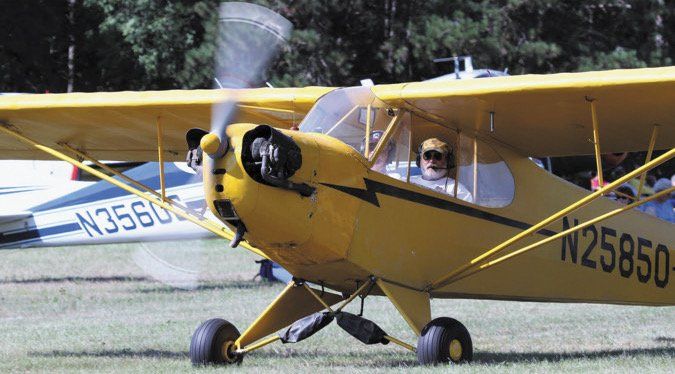The FAA’s BasicMed alternative to a traditional medical certificate is an attractive option for many pilots, especially those of us who are now senior citizens. However, we should recognize that medical issues are not the only factors affecting our ability to fly as we get older. Even in the absence of pathology, age alters our cognitive processes: how we recognize and interpret situations, decide on courses of actions, manage our workload, remember crucial information and skillfully execute our plans. We may joke about our “senior moments,” but many of us wonder if our ability to continue flying skillfully and safely is being undermined.
Indeed, several studies have reported increased incidence of accidents among older pilots. Fortunately, there is research literature on the cognitive effects of aging, and a small subset of it addresses the effects on skills needed by pilots. Accordingly, what follows is a non-technical overview of the research literature, with space only for highlights. Notably, I will not address changes in vision and hearing, which are readily measured and are less likely to go unnoticed than subtle changes in cognition. The findings may be sobering for many, but also contain some good news for those of us who want to continue flying as long as possible.
D. Miller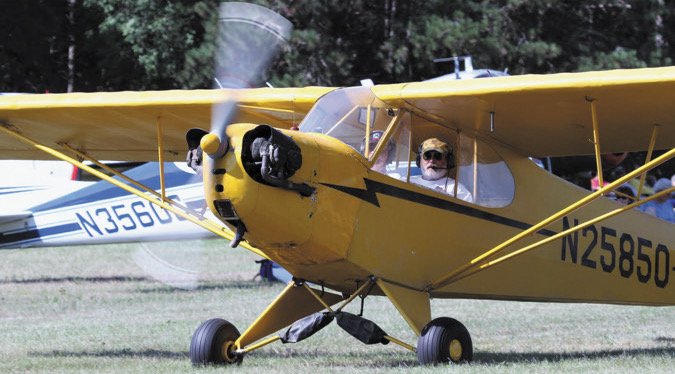
Two basic Modes
Our brains have two basic modes for processing information and guiding action: executive and automatic. Executive processing is closely associated with deliberative thinking and with conscious awareness. It is slow, effortful, serial (one step at a time) and can handle only a small amount of information at any given moment. Looking up an unfamiliar 10-digit phone number and trying to remember it long enough to dial illustrates the capacity limit of executive processes.
Executive processing is required when we are learning new skills, dealing with novel or difficult situations, planning future activities or solving problems. Dealing with flight emergencies, equipment failures or single-pilot IFR without an autopilot are difficult in part because these situations can overwhelm the quite limited capacity of executive processing of information in real time.
In contrast, automatic processing develops over time as we practice tasks in a consistent fashion. It is fast and efficient, and requires little mental effort, allowing a large volume of information to be processed. Automatic processing underlies humans’ extraordinary ability to quickly recognize a vast array of familiar patterns, such as the correct sight picture over the nose of the airplane as we flare to land.
Think back to your first lessons in driving a car. Chances are it was difficult to keep up with all the demands for your attention, remembering what to do when, and coordinating all the separate actions required: Steer to keep the car on the road, watch out for pedestrians, control speed, integrate use of brake, clutch, gas pedal and gearshift. But with practice, driving became much easier; eventually you did not have to think what to do, driving became fluid and effortless, and your mind was freed up to think about other things, such as how to navigate to where you were going.
Actually, the task of driving did not change at all—the same sub-tasks were all still required—but with practice your brain learned how to process all the information automatically and to integrate the sub-tasks into a seamless flow. Driving is just one of the innumerable procedural skills we acquire during our lifetimes, beginning in early childhood—indeed, we could not function in the world if the bulk of our information processing were not handled largely automatically.
Stick and rudder skills illustrate the power of automatic processing. An experienced pilot does not have to deliberate on how much rudder to feed in along with aileron and does not have to think about how much back pressure to put on the stick in a turn. The brain has learned to process and interpret environmental information (e.g., sight picture and control forces) and execute the proper motor control without conscious effort by the pilot.
Basic Cognition In Pilots
The diverse tasks involved in piloting draw upon complex combinations of skill, knowledge and cognitive processing. Learning to fly draws predominantly upon executive processing, but with experience many flight tasks become partially or largely automatic. For example, an experienced instrument pilot readily grasps missed approach instructions from ATC without having to ponder heavily. Recognition of commonly occurring flight situations, their import and how to respond becomes fairly automatic with experience. Recognizing that the plane is trending high on a visual approach quickly triggers an experienced pilot to make an appropriate adjustment.
Decision-making can be fairly automatic in familiar situations, but draws heavily on executive processing in unfamiliar and difficult situations. In many situations, an experienced pilot immediately recognizes the issues but must deliberately think through the specifics (e.g., will I have adequate safety margins departing from this high-density altitude airport at this gross weight, with this wind, with this length runway and these obstacles off the end?).
Executive processes inevitably decline with age. Information processing speed, attention switching and time-sharing, working memory, reasoning, problem-solving ability, recall of information from long-term memory and the rate of learning new associations all erode throughout our lifespan, although the rate of decline varies with individuals. Decrement of some functions (e.g., mental flexibility) can be seen by early adulthood, which may be why many theoretical mathematicians seem to do their best work in their 20s.
In sum, there is a complex intertwining of executive and automatic processes as a function of the specific piloting task and the particular pilot’s experience.
Sorting Age and Experience
So we have two curves, the discouraging decline of executive abilities and the growing skill and domain knowledge that experience provides over time. Eventually, the two curves cross, and the net result is declining overall ability. Where in time the two curves cross varies substantially with the individual; consequent differences in skill levels vary more among older pilots than among younger ones. Genes, health, exercise, diet, mental activity and social engagement all affect the rate of decline, whereas skills can continue to grow with consistent practice. However, be aware that maintaining skill in one type of flight task through practice does not protect other skills that are not practiced regularly.
Piloting performance cannot be measured on a single dimension—it has many aspects. Thus, an older pilot may perform superbly on a vanilla flight review but stumble in situations that combine novel/unfamiliar aspects, high workload and/or time pressure. Basic laboratory research suggests that older pilots may also be more vulnerable to forgetting to perform intended actions (such as completing an interrupted checklist) if not explicitly prompted.
Studying Aging Pilots
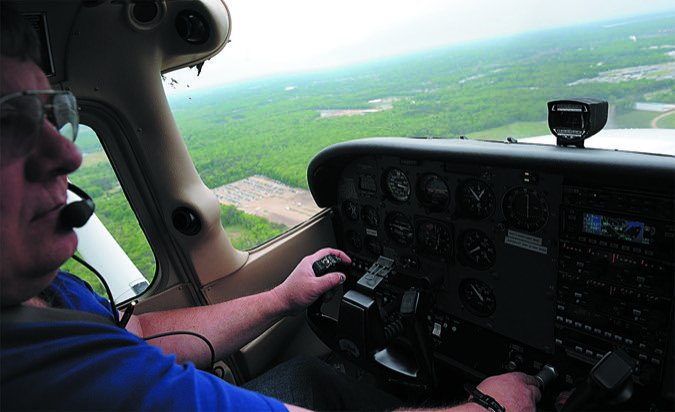
Most of what I have said so far is an extrapolation from laboratory studies of basic cognitive functions and simple tasks. Only a small amount of empirical research has directly studied actual pilot performance as a function of age, but it is informative. These studies, which typically use flight simulators, have examined flight tasks such as accurately executing ATC instructions, noticing and avoiding conflicting traffic, noticing instrument indications of engine problems, controlling the aircraft in holding and landing patterns, flying visual approaches in turbulent crosswinds and making appropriate decisions whether to land in low visibility.
The age ranges of the pilots studied varied—the widest range I have come across is from 19 to 79. Level of expertise is typically represented by advanced ratings (e.g., CFI-I or ATP), number of flight hours, number of recent flight hours or some combination of these factors. (Apparently, all the pilots in these studies maintained good currency.) Diverse measures of cognitive function (e.g., speed of information processing, short-term memory, mental flexibility, etc.) have been used. In several cases, these measures were drawn from the CogScreen-AE, a neurocognitive battery recommended by the FAA for screening pilots.
The results are too diverse to discuss in detail here, but several broad patterns are clear. Increasing age was associated with declining flight performance. This age-related decline was largely accounted for by changes in cognitive functions.
Pilots with higher levels of expertise performed better than those with lower levels. The studies conflict over whether higher levels of expertise slowed the rate of decline in performance with age—some seem to indicate yes, others, no. But it is clear that pilots who achieve a higher level of expertise at some point during their lives can perform better late in life than less expert pilots of the same age. Thus, one way or another, becoming a very skillful pilot can help us keep flying longer in life.
In Perspective
An inherent limitation of these studies should be noted. Obviously, the number of advanced ratings a pilot has or the number of flight hours are at best coarse measures of expertise. Flying requires many different skills, and maintaining proficiency in one skill does not guarantee proficiency in others. The considerable expense and time required for these types of studies has so far prevented us from answering questions like do different skills decay at different rates over time? How much practice is required to maintain a given skill? Do older pilots have to practice more frequently to maintain particular skills?
Another striking aspect I have not seen much discussed in these studies is that the variability in performance of individual pilots appears to be considerably greater than the effects of either age of expertise. We do not know the causes of this large variability. Do some pilots, even though maintaining legal currency, not challenge themselves to continuously improve their skills (“a thousand flight hours versus one hour a thousand times”)? Do some pilots practice only a small subset of the array of skills required to be truly proficient? Are some pilots aging faster than others, physically and cognitively?
Lest you young pilots think you can skip this article, ask not for whom the bell tolls. Most cognitive abilities decline throughout our entire adulthood. Fortunately, we can partially protect ourselves in two ways: 1) the flying skills we acquire and maintain over time can to some degree compensate for declines in basic cognitive processes such as attention and working memory, and 2) we can adopt explicit compensatory strategies for how we approach flying, along the lines of the old adage about using our superior judgment to avoid situations that require superior skill.
Ways To Stay in the Game As Long As Possible
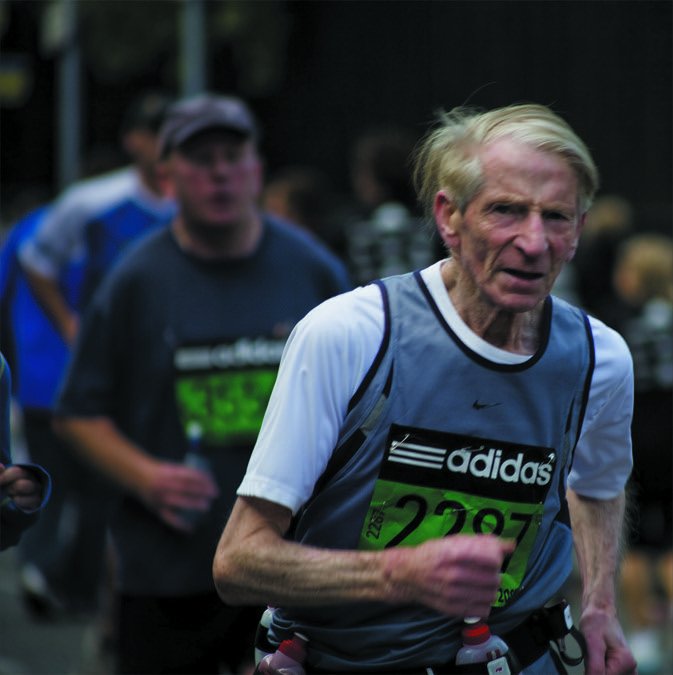
– Exercise, exercise, exercise! A large body of research shows that consistent age-appropriate exercise is one of our most powerful tools for maintaining both physical health and cognitive abilities. Among other benefits, exercise keeps the flow of oxygen to the brain going.
– A healthy diet also helps our cardiovascular system support our brain. Working with your physician to stay on top of medical issues protects both physical health and cognitive abilities.
– Cultivate a deliberate, systematic approach to all flight tasks. This, along with conscientious use of checklists, can help protect us against distractions, tunneling of attention and forgetting to perform critical tasks. Never, ever rush.
– Inform passengers about the sterile cockpit rule to avoid distractions during critical phases of flight.
– Periodically self-evaluate your performance in both routine and challenging situations.
– Maintain a high level of currency in all aircraft and in all flight tasks in which you may find yourself acting as pilot in command. This is especially important as we get older because we don’t reacquire skills as quickly as we once did.
– Fly with an instructor more often than every two years and find an instructor who is willing to challenge you beyond the vanilla flight review.
– Be wary of fatigue, dehydration and hypoxia; our susceptibility increases with age. Yet, when we’re busy with flight demands, we may not realize we are being affected. Use supplemental oxygen at lower altitudes than the FAA requires.
But What About Bob Hoover?
H. Michael Miley.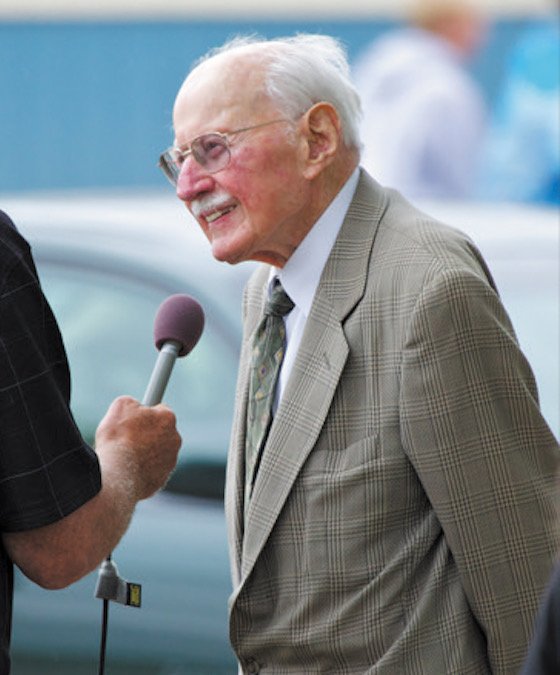
The story of the late aviation icon Bob Hoover, who none other than Jimmy Doolittle called “the greatest stick-and-rudder man who ever lived” and who was grounded by the FAA in 1992 for medical reasons, is a cautionary tale for many pilots. The FAA revoked Hoover’s medical certificate “despite no evidence of a medical problem,” according to AOPA. After undergoing multiple medical exams and his situation becoming a cause clbre among GA pilots, FAA Federal Air Surgeon Jon L. Jordan agreed to consider a special issuance of Hoover’s medical certificate. Jordan later wrote, “Repeat studies revealed some unexpected normalizing changes in his clinical condition,” and the FAA issued the medical certificate.
The FAA’s BasicMed medical certification process can trace its roots directly to Hoover’s situation, but it turns out there is even more good news for us old geezers. For one thing, our automatic mental processes are fairly resilient to aging. Stick and rudder skills, for example, can remain high throughout life with consistent practice. Also, personal experience with a wide range of situations enables high-time pilots to quickly recognize the nature of situations and retrieve from memory an appropriate response. Highly experienced pilots have a broader range of skills and aviation knowledge that help these pilots deal with non-normal situations by freeing up limited-capacity executive processes to analyze the situation. Quality of judgment can also grow with experience throughout life, and experienced pilots can use strategies to avoid getting into overwhelming situations.
Suggested Reading
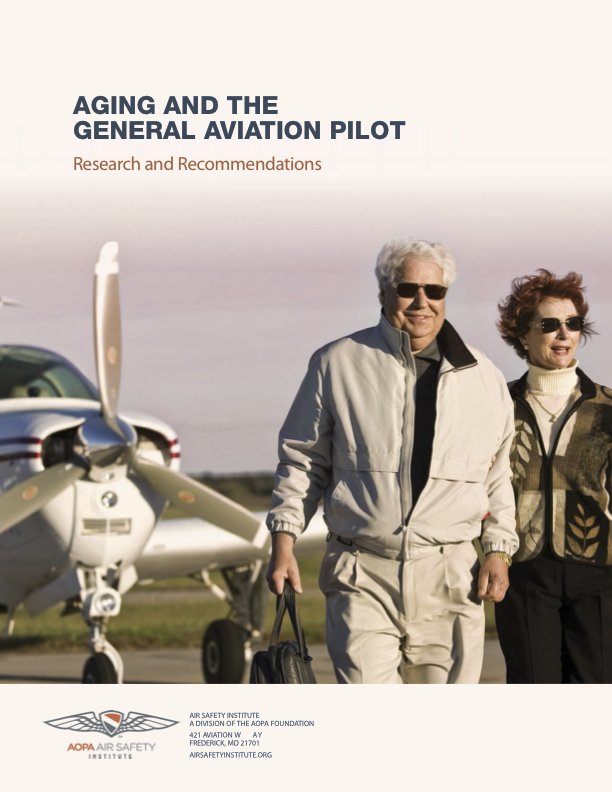
AOPA Air Safety Institute (no date). Aging And The General Aviation Pilot. Retrieved October 10, 2017. tinyurl.com/AVSAFE-Aging
Salthouse, T.A. (2004). What and when of cognitive aging. Current Directions in Psychological Science. 13, 140-144.
Kennedy, Q., Taylor, J.L., Reade, G., & Yesavage, J.A. (2010). Age and expertise effects in aviation decision making and flight control in a flight simulator. Aviation Space & Environmental Medicine, 81, 489-497.
Van Benthem, K. & Herdman, C.M. (2016). Cognitive factors mediate the relation between age and flight path maintenance in general aviation. Aviation Psychology and Applied Human Factors, 6, 81-90.
Key Dismukes, PhD, retired as Chief Scientist for Aerospace Human Factors at NASA Ames Research Center. He holds airline transport pilot and glider flight instructor certificates, plus Boeing 737 and Cessna Citation type ratings.

